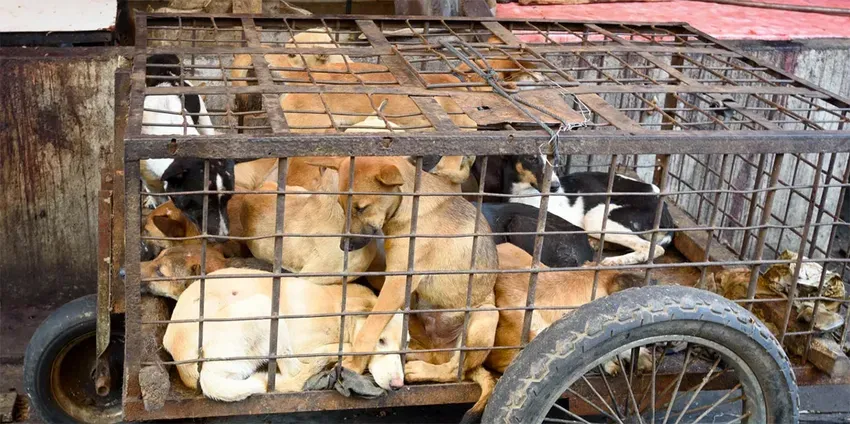The year is 2022, and in some parts of the world, people are still eating dogs. Some might argue that the act alone is barbaric; dogs, they might say, hold a special place in relation to humans. Others – whether vegetarians, vegans, or omnivores – might roll their eyes at the idea of canine exceptionalism, and ask why dogs are more deserving of our empathy than cows, chickens, or other animals.
Most can probably agree, though, that unnecessary suffering isn't a good thing for any animal. Yet the production and sale of dog meat persists in parts of Asia, even in the face of laws and regulations that ban the practice, and in ways that go beyond inhumane.
Humane Society International (HSI) estimates that 30 million dogs are killed for their meat across Asia each year, and HSI volunteers have harrowing stories of what that looks like. They tell of dogs packed onto trucks, visibly diseased, injured, and malnourished, and of slaughters by electrocution, beating, hanging, or boiling. If the dogs aren't born into the meat trade, they might be taken off the street, or even stolen from homes, according to accounts.
Readers hearing about this for the first time might wonder why the practice continues. For answers, I reached out to SēN Rescue Sanctuary, a nonprofit based in Elma, Wash., that works with HSI and two other rescue groups to save dogs from slaughter in South Korea.
SēN founder Sally Newberry said of dog farms, "I don't care that they eat [the dogs]. I care that [the dogs] are tortured. They think more the dog is tortured, the more hormones will be in the meat."
In some folk medicine traditions, Newberry went on, eating the hormone-rich meat is supposed to be good for men's libido, and help people stay cool in hot weather. "But studies have shown that that isn't true at all."
Newberry's tone was matter-of-fact. Her parents ran their own rescue nonprofit when she was growing up, so sordid details like these have been a part of her reality since she was a child. In the nine years she has kept SēN running, she has rescued, rehabilitated, and rehomed over 900 dogs from the dog-meat trade in South Korea.
That is a staggering number considering the preparations needed. SēN usually transports one dog at a time. Rescues are rehabilitated, vaccinated, and treated for injuries, which can involve surgery. Then they need to be transported to the US, cleared with customs, and handed off to their new owners.
"I've had some people wait months before they see their dog," Newberry said.
But every step is important; these rescues aren't just strays from the pound; they're dogs with a past of unspeakable abuse and neglect.
SēN stays open seven days a week to answer calls from rescuers about how to treat a dog with such a background. Carlos Jimenez is one such rescuer. He visited Seattle during this year's Pride weekend to pick up a SēN rescue and add it to his and his wife Anela's pack. Jimenez has adopted from a few organizations, and he seemed to favor SēN's practices the most.
One rescue he worked with transported dogs "like livestock," Jimenez said, with the crates stacked on top of each other in trucks. "And I've driven livestock before. Not even cows are treated that bad."
The same nonprofit allegedly charged Jimenez and his wife $6,000, almost twice as much as the original fee, and a little under 12 times what SēN charges. So for adopters, it's worth it to carefully consider one's choice of nonprofit, since not all of them operate with the same care.
On a lighter note, the practice of eating dog meat has greatly diminished in many Asian countries over the last decade alone. In countries where the sale of dog meat isn't already illegal, campaigns and proposals are rising to change that.
"There are so many of these meat farms. That won't change overnight," Newberry said, but she was hopeful about the future.
"Younger generations can make the biggest difference."


